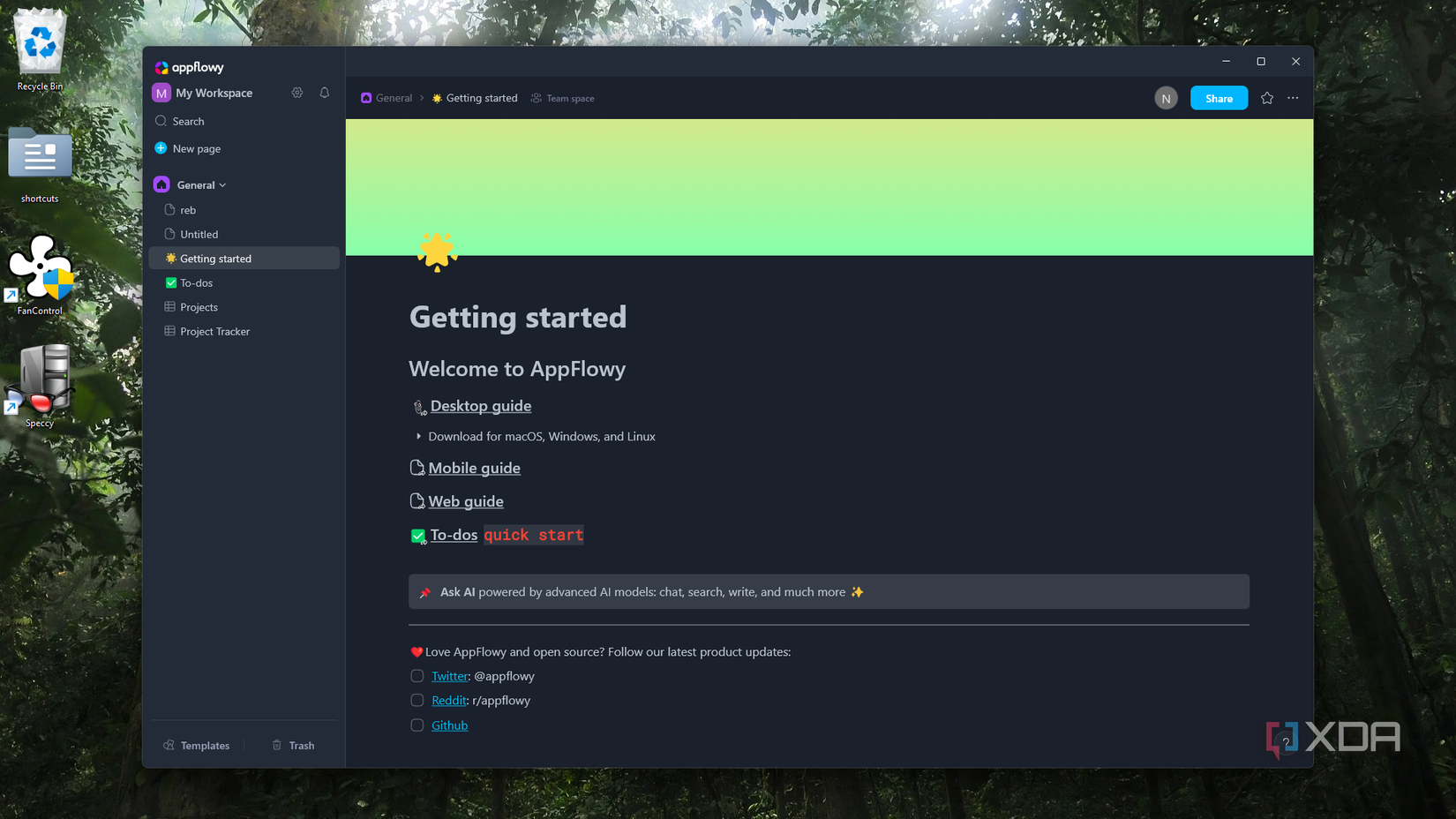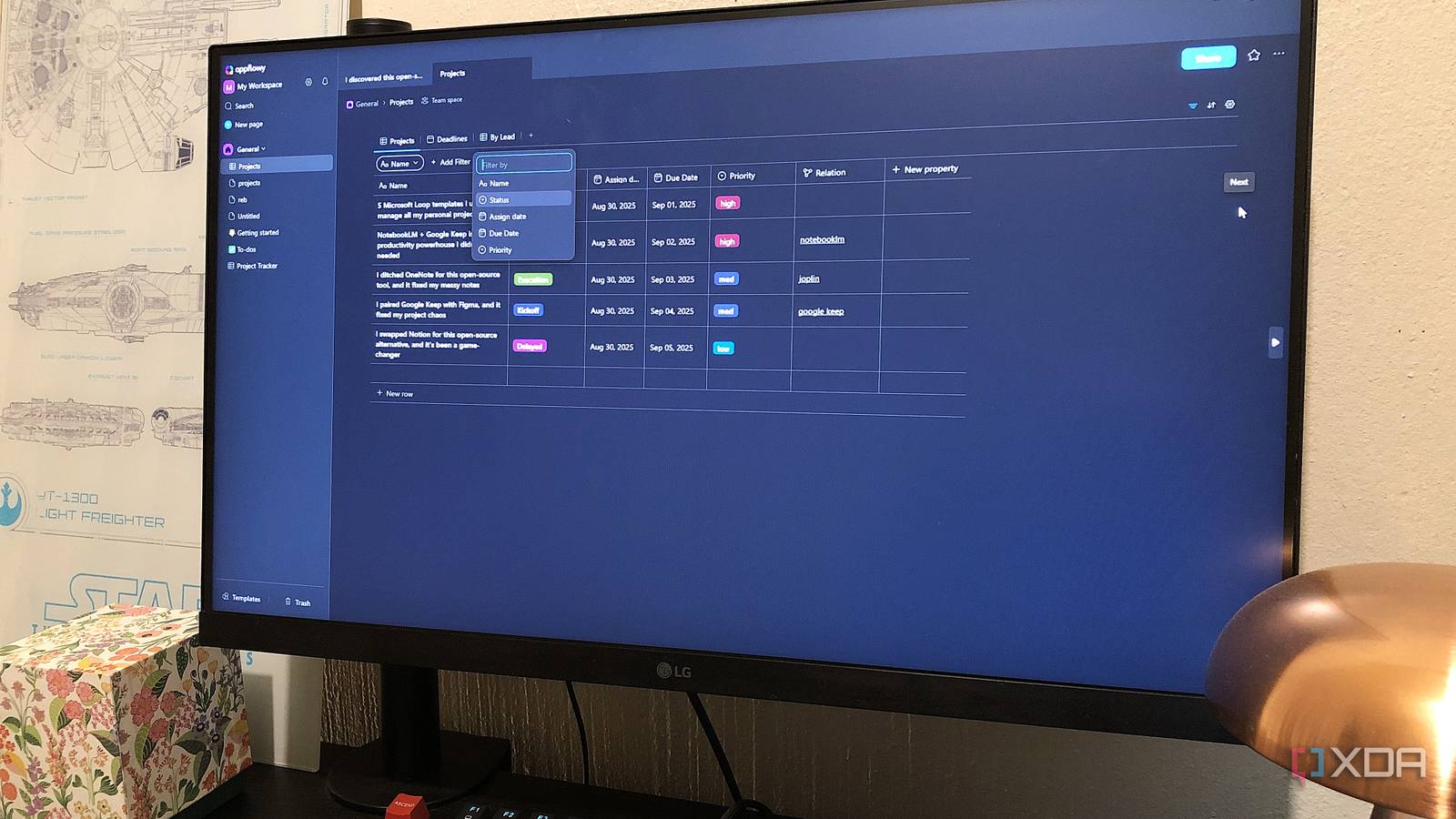Quick Links
The features that make AppFlowy a viable Notion alternative
Notion has been my go-to productivity suite for years. It’s like a digital binder that holds everything from drafts to notes and budgeting. But even after all this time, there were still cracks. It’s a little bloated and can be difficult to navigate at times. Plus, it’s not very privacy-forward.
As I’ve been exploring open-source options for note-taking, I came across AppFlowy, a free, privacy-first alternative. Playing around with it quickly made me realize that it’s more than just a note-taking app; it’s a full productivity suite. AppFlowy is a workspace designed for task management, notes, wikis, projects, and collaboration. It covers the same use cases as Notion.
Why AppFlowy stands out
It beats Notion in several key areas

Before I even installed the app, the first thing that hooked me about AppFlowy was its ethos. It’s built to respect privacy; everything is stored locally by default, which is very refreshing. AppFlowy offers cloud storage: 5GB for free users or unlimited with the $10 per month paid tier. It gives you the option to use its official cloud server or use a self-hosted cloud server.
Another thing that ties into AppFlowy’s privacy-forward philosophy is that you control the encryption of your data. With Notion, your data is encrypted, but it holds the keys. Furthermore, AppFlowy has an offline mode, designed to work seamlessly even without an internet connection. While you can use Notion offline, you still need to be connected for some of your pages to load initially.
Another big win for AppFlowy is its speed and simplicity. The app loads faster on my PC, even with multiple projects and databases, whereas I sometimes lose momentum in Notion waiting for things to sync. The UI is also more digestible and easier to navigate; I love how everything is immediately visible instead of tucked away in massive dropdown lists like in Notion. Overall, the AppFlowy app is more clutter-free and snappier.
The features that make AppFlowy a viable Notion alternative
It covers most features that individuals use Notion for
What shocked me most was how familiar AppFlowy felt from the start. While it is more minimal, it’s not barebones by any means, and has many of the core features that drew me to Notion in the first place. Upon opening AppFlowy, you have your workspaces and pages in the left panel with the editor in the center. In the editor, you build out your page using blocks, and they nearly mirror Notion’s blocks. There’s rich text editing, lists, tables, images, calendars; anything you could possibly want to insert is there. It also comes with templates. I’m customizing the Projects template here.
Another big hook is that AppFlowy comes decked out with database features and functions. You can build a database table with the Grid function, then also turn it into a Kanban board or calendar. You can add a filter for any property in the database, as well as add relations to create links between two databases — this is one of my top database tricks that eliminates spreadsheets. While AppFlowy doesn’t have features like rollups or advanced formulas (yet), it still covers everything that I used to rely on Notion for. The core functionality is there, minus the “enterprise-y” features I never really needed anyway.
Just like Notion, AppFlowy is also cross-platform. It works on Windows, macOS, Linux, iOS, and Android. The only thing I consider a major downside is that you can’t export your pages as PDF files — the app is still under development, so this might be something we can expect in the future.
How I’ve been using AppFlowy
It’s perfect for notes and project management
The cloud version of AppFlowy lets you migrate your Notion files. Since I’m using the local version, I had to start from scratch, but this was a good opportunity to get familiar with the app. The real test was whether AppFlowy could keep up with the messy overlap of my projects. This includes assignments, novel drafts, design resources, grocery lists, financial planning, and more.
Two of my favorite features I use daily are the Checklist and Toggle List blocks. Checklists are self-explanatory — they help keep me accountable with day-to-day tasks like chores and errands. Toggle Lists are little lifesavers that collapse the text you enter underneath them, keeping things uncluttered by hiding whatever mess I have going on in a text box. They’re perfect for storing resources and notes.
I utilize the databases extensively for more complex projects with specific deadlines. I basically do the same thing I did in Notion: expand on every entry title with my notes and links, add a priority, set a due date, and set a status. Planning my novel is actually where databases shine the most — I have one for tracking chapters, another for characters, and so on, and link them all together so I can easily jump between different scenes or dialogue ideas. For my design work, I use the Kanban board; Every card represents a task or larger project, and I simply drag them between To-Do, Doing, and Done.
A lighter, more efficient workspace
AppFlowy is fast and flexible enough to handle everything I throw at it. Sure, it may not have every single feature Notion does, but if you’re just an average, individual user like me, you won’t miss out on much — the simplicity actually ended up improving my project workflow. The privacy-forward philosophy is a welcome addition. AppFlowy feels like the right balance of everything I need from a productivity suite; I couldn’t have stumbled across a better tool.

